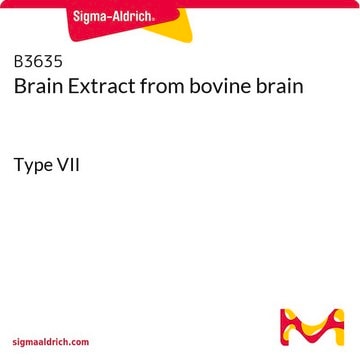B7906
1-Butanol
for molecular biology, ≥99%
Sinónimos:
n-Butanol, Butyl alcohol
About This Item
Productos recomendados
grade
for molecular biology
vapor density
2.55 (vs air)
vapor pressure
5 (4 mmHg) at 20 °C hPa
assay
≥99%
form
liquid
autoignition temp.
649 °F
expl. lim.
11.2 %
color
colorless
refractive index
n20/D 1.399 (lit.)
pH
7 (20 °C, 70 g/L)
bp
116-118 °C (lit.)
mp
−90 °C (lit.)
density
0.81 g/mL at 25 °C (lit.)
storage temp.
room temp
SMILES string
CCCCO
InChI
1S/C4H10O/c1-2-3-4-5/h5H,2-4H2,1H3
InChI key
LRHPLDYGYMQRHN-UHFFFAOYSA-N
¿Está buscando productos similares? Visita Guía de comparación de productos
General description
Application
- in the derivatization process for measuring methylated arginine levels in blood samples
- in liquid-chromatography mass spectrometry (LC-MS) analysis of lysine modifications by deacetylase CobB
- in the extraction of plant material from Vigna unguiculata
- to extract and purify amplified human DNA samples before further amplification by PCR followed by sequencing
1-Butanol is suitable for use in nucleic acid purification and concentration protocols.
Related product
signalword
Danger
Hazard Classifications
Acute Tox. 4 Oral - Eye Dam. 1 - Flam. Liq. 3 - Skin Irrit. 2 - STOT SE 3
target_organs
Respiratory system
Storage Class
3 - Flammable liquids
wgk_germany
WGK 1
flash_point_f
95.0 °F - Pensky-Martens closed cup
flash_point_c
35 °C - Pensky-Martens closed cup
ppe
Eyeshields, Faceshields, Gloves, type ABEK (EN14387) respirator filter
Certificados de análisis (COA)
Busque Certificados de análisis (COA) introduciendo el número de lote del producto. Los números de lote se encuentran en la etiqueta del producto después de las palabras «Lot» o «Batch»
¿Ya tiene este producto?
Encuentre la documentación para los productos que ha comprado recientemente en la Biblioteca de documentos.
Los clientes también vieron
Nuestro equipo de científicos tiene experiencia en todas las áreas de investigación: Ciencias de la vida, Ciencia de los materiales, Síntesis química, Cromatografía, Analítica y muchas otras.
Póngase en contacto con el Servicio técnico












